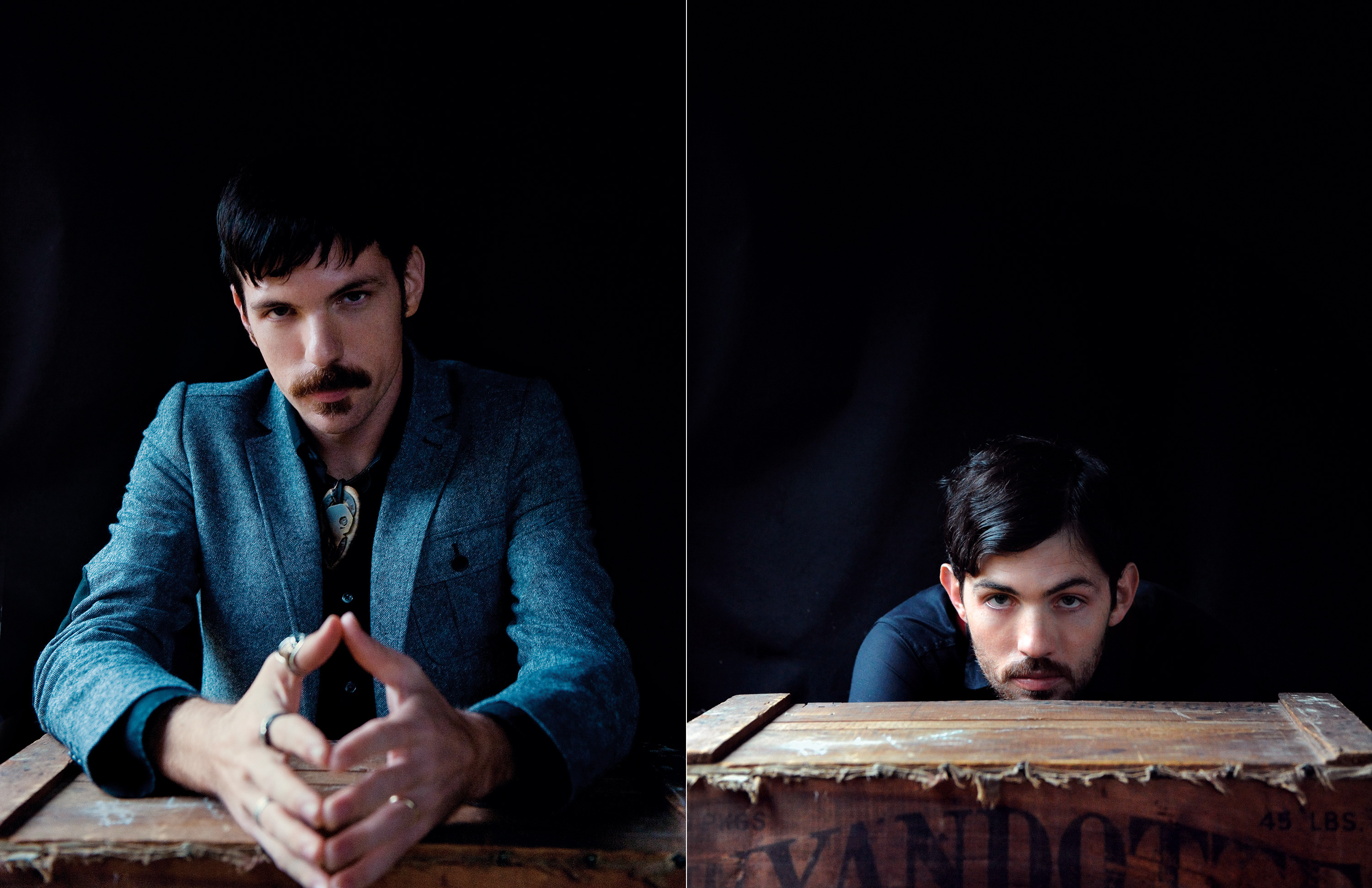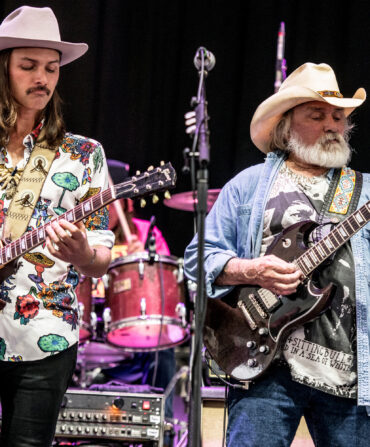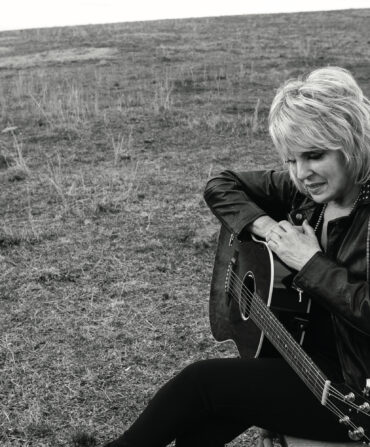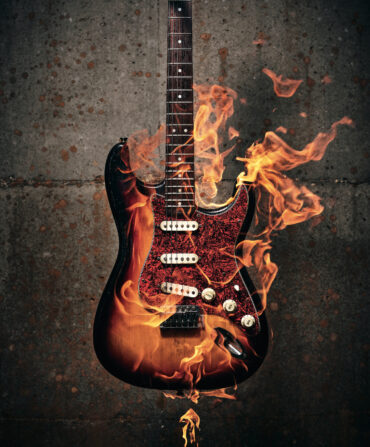Artists
The Brothers Avett
Scott and Seth Avett play some 200 gigs a year, but when the music stops, there’s no place they’d rather be than their North Carolina home

Photo: David McClister
From left: Seth Avett; Scott Avett.
The road to the Avett brothers’ family home in Concord, North Carolina, snakes through suburbia, passing freshly constructed strip malls and a pristine elementary school. But then the pavement gives way to gravel, the trees become thicker, the distance between houses grows longer. It’s nearly dark, but in the woods behind a weather-beaten farmhouse, the faint notes of a banjo and a guitar can be heard underneath blissful harmonies.
Scott and Seth Avett are sitting on wooden boxes, playing a delicate version of “The Weight of Lies” from their 2007 album Emotionalism for a video crew. Their playing is gentle, but their voices are forceful, confident; voices that were probably honed from years of picking parties with their family and friends.
Except they weren’t. “Bluegrass was never a part of our upbringing,” says Scott, 34, having changed from his old-time “stage gear” to a comfy gray hoodie and jeans. He’s seated at his parents’ kitchen table with his younger brother sipping tea and scarfing down some crackers and cheese. “I just did a two-hour drive listening to this great bluegrass station and I didn’t recognize a song,” Seth, 30, adds. But over the course of ten years, the Avett Brothers have become the preeminent iconic roots rock act in the country, incorporating elements of punk, folk, country, and yes, bluegrass that transcends the limits of any label or genre. The band has gone from playing for ten people in a Greenville, North Carolina, coffeehouse in 2000 to blowing away ten thousand fans at a concert in 2009.
Homegrown
The Avetts’ childhood home was given to their father, Jim, in the 1940s—costing him only “fifteen dollars for a lawyer to draw up the contract and fifty dollars for the deed.” Through the years, Jim has added on to it, giving it a ramshackle, rambling feel, but making it a home whose walls reek with love and camaraderie. The brothers grew up in this house on a sixty-acre plot of land that was also a bit of a hobby farm. Indeed, the kids lived among dozens of cats and dogs and were responsible for the upkeep, gathering eggs from the chickens and feeding the cows and pigs. “When you’re nine years old, staring down a giant pig, you grow up real quick,” Scott says. At their day jobs, Jim was a welder and his wife was a schoolteacher, while the brothers did a lot of manual labor, including welding for their father and landscaping.
Though they play gigs all over the world, home remains the textile town of Concord. “We don’t want to be where all the action is,” Seth says. “We just want to be where we’re from.” On this day, the brothers are enjoying some much-needed downtime sandwiched between wrapping up a major tour on Halloween in Nashville and embarking on a winter jaunt on which they will play a number of shows, including a sold-out performance on New Year’s Eve at the Asheville Civic Center. “I just want to live someplace modest, and North Carolina is home,” Scott says. “The chains that I thought were holding me back were actually arms that brought me back when I wanted them to.”
Despite the absence of bluegrass, music was definitely a key part of the brothers’ upbringing. Jim—who is a musician in his own right, just releasing an album of country tunes—encouraged each of them to take piano lessons and kept a box of old eight-track tapes with albums by Three Dog Night, John Denver, Neil Young, and Bob Dylan at the ready. The brothers also delved into early ’80s albums from Men at Work, Hall & Oates, and Michael Jackson.
Occasionally, friends of their parents would come over and play guitar, drink, and smoke. “I definitely remember more Coors Light being drunk than playing,” Scott says, laughing. “There were these guys who wore leather jackets and looked like Kenny Rogers sitting in the living room.” While their parents and friends jammed to Hank Williams and Tom T. Hall, the boys were drawn to heavier music.

Photo: David McClister
The Avetts clown around for the camera at their family farm.
“A cousin of ours was a big Rush fan and he’d take us up into the bedroom and play drums,” Scott adds. “That was the dark side.” Moving on from mid-’80s metal, both gravitated to punk bands. “There were a lot of influences running parallel with those bands,” Seth says. “We were also listening to Blind Willie McTell. But nothing like Flatt and Scruggs—we wouldn’t even recognize their music. We would never say Flatt and Scruggs as an influence.”
Blasphemy to some, but in the Avetts’ world, hard-core sounds are just as present as any banjo. Scott Avett formed a heavy rock band called Nemo with friends from East Carolina University while Seth was playing with Margo, a melodic rock outfit based in Charlotte. “It was the NASCAR thing, big football. We didn’t relate to that,” says Scott, hinting at the brothers’ rebellious streak. “We didn’t want to swallow what we were being given.” Eventually the two merged their bands and began to slog it out of the North Carolina college and coffeehouse circuit, dabbling with acoustic instruments while still maintaining the intensity of their former projects. They would take the stage at places like the Percolator in Greenville, North Carolina, playing after bands with names like Acid Bath. They’d also play house parties where the beer-soaked room heaved from the kids and anti-authority delinquents going bonkers. “Both of us got teeth knocked out by microphones,” Seth says. “People were on top of you, drinking and screaming. We both scream really loud, and that’s why we project now. We just wanted to play and drink beer.”
Band of Brothers
What is now the Avett Brothers began as an acoustic side show, dubbed the Back Porch Project, which became a full-fledged band by adding upright bassist Bob Crawford in 2002. Listening obsessively to the Old & in the Way album—a bluegrass classic by Peter Rowan, David Grisman, and Jerry Garcia, among others—the trio made their full-length debut with 2002’s Country Was followed by 2003’s A Carolina Jubilee. The brothers then spent much of the next few years in New York, soaking up the city and honing their writing.
Eschewing the rising picking scene in the bars of Greenwich Village and Brooklyn—where several of the Punch Brothers earned their chops—the Avetts hung out with artists like Regina Spektor and Langhorne Slim, who emphasized storytelling in their lyrics over proficient musicianship. A key point of difference with other progressive bluegrass bands: The Avett Brothers are obsessed with writing strong narrative tales so vivid and cinematic they feel like a screenplay for the next Coen brothers movie.
“You write words, then figure out the chords,” Scott says. To this day, the brothers write constantly. Earlier in the morning, Seth spent an hour churning out words, while Scott wrote one verse for a new song. “You take the twenty minutes you don’t have and get it done,” he says. “I’m constantly interested in the darkness and light, good versus evil. We draw a ton from our own experiences. We grew up going to church, and our grandfather was a Methodist minister. Sometimes religion and exercise can be the same thing.”
After years of putting out their own records and building up a rabid fan base, in 2008, the Avetts caught the attention of mega-producer Rick Rubin, who famously resurrected the career of Johnny Cash in the mid-1990s. Rubin has a notoriously heavy hand with some artists, but with the Avetts’ track record, he let the band take the lead, guiding the project only when necessary. The resulting I and Love and You is a leap for some Avetts fans. The songs are ballads—epic ballads—sparer and more pop oriented, but a record made in complete harmony given that the brothers had quit drinking earlier that year. “When we were young, it didn’t matter,” Scott says. “But then it started affecting our artistic decisions. We had to change.”
The Avetts say the jump musically is all on them. Some songs like “Laundry Room” started out as typical banjo-driven numbers but morphed overnight. “It just sounded like broken glass,” Scott says. “But the next morning Seth sat at the piano, I was at the guitar, and it worked. We had to take it out of that live mentality. We’ve been chasing the live thing in the studio for years, and sometimes it just doesn’t work.”
And while I and Love and You made it to number 16 on the Billboard 200, the moderate success of the album doesn’t help you sell out two nights at the Ryman Auditorium or play to ten thousand people in your hometown. It’s a dogged road schedule—often more than two hundred dates a year—changing the set lists every night, creating an intimate relationship with your audience that keeps fans interested and coming back for more. And staying true to your roots doesn’t hurt either.
“No one ever came to one of our shows and saw only bluegrass,” Scott says. “The label ‘punk-grass’ bothered me at first; now I don’t care. Things are getting bigger for us—we’re on that journey. We may fail and be playing some bar down the street. But whatever happens, all I know is that in five years, I want to be sitting in this same chair at this same table.”







